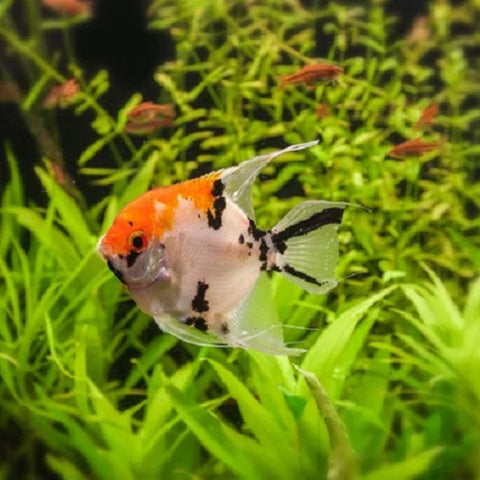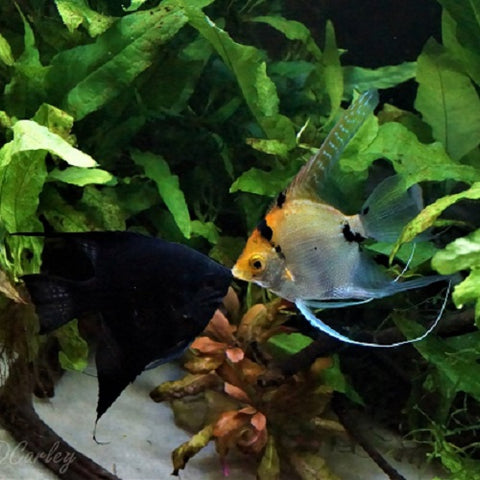Angelfish look adorable in our fish tanks. Their presence in the fish tank gives a striking appearance. After some days you’ll be familiar with their behaviors similar to other fish but somehow they reveal their romantic side to us.
If you have more than one angelfish you might have noticed them kissing. It can be a sign of mating or fighting, you should pay attention to this behavior since fighting can lead to hurt.
In this article, we will share with you some amazing facts and reasons behind this mystery of the kiss. Sometimes this unique behavior makes aquarists blush and also fills them with queries. Not funny!!
Stick with us till the end and let us starts with their introduction and know why your angel fish are kissing with the valuable context.
Introduction to angelfish

The species of angelfish are found in multiple colors including black. Some marine species are having dark color strips, or whirling multicolored patterns on their scales.
They are small-sized fish with a flat body shape with bent dorsal and anal fins. They belong to the Pomacanthidae family, in Greek which means "cover thorn", so they have a thorn and spiny growth.
They are freshwater fish and native to the tropical Atlantic, western pacific, and also in Indian Oceans. They usually don’t migrate but when we place them in the tank, they adapt to the water condition and environment of the tank.
The adult size can be up to lengths of 15 cm (6 inches). Angelfish fish are omnivores and consume sponges, shrimp fragments, and algae. The larger species of this fish may consume larger prey but all do care for their eggs and young ones.
Why do angelfish lip-lock?

Why do angelfish kiss? If you are new to observing this behavior for the first time, it might under one of the conditions. The locking of lips occurs when two fish pair off for mating purposes or the breeding process.
However, things are occasionally more difficult than that. Fish will also lock their lips in an act of aggression, which can also occur between angelfish of any gender. So what’s the real condition behind lip-lock?
Whether my angelfish are kissing, biting, or fighting?
Many aquarists have observed that lip-locking is a common behavior of angelfish. But via guessing what are they actually doing could be challenging. Monitoring your angelfish's activity for a defined amount of time will allow you to see what they're doing and why they're locking lips. However, after the damages, it’s easy to tell the difference.
Are my angelfish fighting?
As a matter of fact, lips locking between two same gender is a sign of showing dominance rather than mating. If your fish are locking their lips in aggressiveness, you're probably wondering where this hate-type feeling is coming from. Your angelfish may act violently towards one another for a variety of reasons.
Angelfish show their territorial behavior and they don’t want that other male fish will steal their mate. Similar to other animals these species of fish want that their genes should be passed on and to protect their mates, they attack the other fish.
For the goal of establishing their hierarchy, they usually start to fight with their mouth. The first attack with the lip-locking, and trying to tear competitors around the mouth and fins thus resulting in big damages like damaged eyes, scale missing on their body and in some cases jaws are dislocated.
Are my angelfish biting?
They use their teeth as the defender and try to bite with the teeth while fighting. They also bite to steal the food materials.
While mating they also bite slowly to show their compatibility with their breeding partner.
Are my angelfish mating?
To begin with, the likelihood of mating could be the main reason. Especially, when one of the pair of angelfish is female. However, if you have a male and a female you can bet that they are looking to mate.
One thing is to make sure that to increase your chances of a successful spawning, make sure you have the same breed of fish in the tank. Cross-breeding is a bit understandable.
Do Angelfish lock lips for mating purposes?

Sometimes by kissing, the female is evaluating the male's strength in preparation for mating. When angelfish are ready to mate they show up their signs and we can also notice their adorable behavioral changes as follows:
- Females start twisting around the male fish.
- They start flashing their fins.
- They jointly choose a location and clean for mating and laying of eggs.
- Before mating female fish develop a bulging belly and also start pecking each other.
Once the lip-locking begins, you have every reason to blush or be cheerful. The female will eventually begin to expand as her eggs mature. She will place them in the nest when the time comes. The male is then responsible for fertilizing the eggs and defending them against any predators.
The only way to find comfort in your angelfish's aggressive behavior is to identify one of them as a female. This indicates that lip-locking is most likely a hint of mating behavior.
However, determining the sex of angelfish is the difficult cause of their identical look. We have mentioned below how to make difference between a male and a female angelfish.
Do angelfish mate for life?
Some believe that angelfish mate for life. But this is not the case even if a pair has their offspring then one of the parents may decide to seek another mate after a few spawning.
This is concluded that after one mating they are no more interested in the same mate. But they pretend for being together even after mating to show affection. But they moved when they get another sign of the presence of females.
In the tank, there is a lack of options so they usually swim and live together. They also defend their territory when other fish try to enter or disturb them for food.
How to prevent Angelfish from lip-locking?
There are multiple ways to prevent angelfish from lip-locking. These processes help fish out of danger of fighting and also keep them more disciplined.
- Scientifically, it proved that these fishes communicate their similar kind with the urine and bile that are released in water by them. If we change the water from time to time then it will reduce the destructive behavior of fish due to lack of communication.
- We can also change the position or order of the decorations, including plants and substrates, to make a new look that will confuse fish that this is not their territory.
- These fish, especially female ones have become more aggressive while the period of mating. So, it will be good to shift the breeding pair to another tank.
- If a male fish will find another fish then they will surely fight either for mates, food or to swim freely to show their dominance. It will be good if we shift them to a big tank so they can freely swim without bullying, chasing, or pecking each other.
- We can also fill the aquarium with more fish, this will serve as a diversion and have less attraction. Select bigger size fish to avoid fighting.
- Feed them 2-3 times a day with only sufficient diet programs and clean the tank waste. Also, add some healthy food to their diet.
Do you have male or female angelfish?

By determining the sex of angelfish we can easily identify the lip-locking action which is indicative of mating or fighting, although this can be challenging. Observing their behavior is another method for determining gender.
Even aquarists have difficulties recognizing whether an angelfish is male or female at times. But there are some noticeable points that help to find out the difference as follows:
- The shape of the head has a small variance by having a crown. If you focus on their heads, you'll see that the crown-like structure is more apparent in male fish which is absent in females.
- Male fish are more imperial-minded than female fish. This could be noticed in how they interact with other male fish.
- As we mentioned while mating, female fish develop a bulging belly.
- A tube connects the ventral and caudal fins in both genders. This tube is thicker in female fish than in male fish.
However, in many circumstances, you must wait until your female fish has begun to spawn before you can tell the difference. If you can't figure it out, you may always get assistance from an expert.

